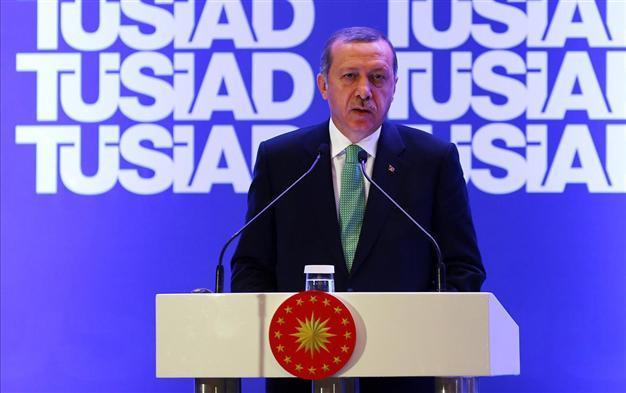President Erdoğan again slams Gezi protesters, declares pro-Gülen bank ‘already bankrupt’
ISTANBUL

President Erdoğan maintained his harsh tone during his speech at the Turkish Industry and Business Association (TUSİAD) in Istanbul Sept. 18. REUTERS Photo / Murad Sezer
Recep Tayyip Erdoğan has signaled no change to his tone as president, again slamming last year’s Gezi protests for “attempting to overthrow the government” while also declaring a bank affiliated with the movement of U.S.-based Islamic Scholar Fethullah Gülen “bankrupt.”Speaking at a meeting of the Turkish Industrial and Business Association (TÜSİAD), Turkey’s top business group, Erdoğan described “what happened in Ukraine, Egypt and Syria” as being “similar to the Gezi Park protests.”
“In Egypt, the elected president was ousted in a coup led by the individual who was his defense minister. They killed over 5,000 people in one day. In Ukraine, the country came to the brink of division. Events that started as an innocent movement brought it to that point. In Syria, close to 6 million people have fled the country, 1.2 million of whom are in Turkey,” he said.
The president also repeated his conviction that last year’s corruption probes targeting him and his close aides were an “attempted coup.” “It was an attempt to resurrect the old Turkey, when whoever wanted to could overthrow a government in 24 hours and bring a new one. The interest rate lobbies rubbed their hands in glee,” he said.
Erdoğan’s participation in the meeting has been interpreted as a sign of a possible thawing of chilly relations between himself and TÜSİAD. But in his speech he did not hesitate to justify his personal intervention on economic issues, particularly in the case of Bank Asya, a Gülen-affiliated bank that suffered a huge profit decline after state-owned companies and institutional depositors loyal to Erdoğan withdrew the equivalent of 20 percent of its deposits.
Bank Asya was also recently put under scrutiny by Turkey’s banking watchdog, after an inspection that Erdoğan said was ordered by him.
“I ordered an audit of the bank. The bank’s current assets had grown eight-fold and its deposits had grown six-fold over the past 12 years. Pardon me, but there is no a president who sits back [in this situation]. We had to conduct this audit to find out where the mistake was,” he said, rejecting accusations that he was conducting a “smear campaign” against the bank due to its affiliation with his one-time ally turned arch-nemesis.
“The leader of the main opposition said I was trying to bankrupt a bank. But the bank has already gone bankrupt,” Erdoğan said, also refusing claims that Bank Asya’s bankruptcy could cause a domino effect in the sector.
Rating agencies, business world should appreciate AKP 'achievements'
International rating agencies Moody’s and Fitch received the lion’s share of Erdoğan’s ire, with the president reiterating his unease with their recent judgments about the Turkish economy.
“There is a bad intention here, what is it? ‘We couldn’t topple Turkey politically, so we should topple Turkey economically with whatever it takes,’” he said, accusing the agencies of acting on “political motivations” rather than economic indicators.
Erdoğan said the business community should be aware of the danger of such “smear campaigns.”
He also blasted certain local businesspeople for publicly criticizing the political and economic policies of the government, accusing them of not “appreciating the achievements” of the 12-year Justice and Development (AKP) rule.
“Company boards draw a really pessimistic view. They say the achievements have been shadowed, Turkey’s reputation abroad has been damaged, the legal system has started to be questioned,” Erdoğan said.
Speaking at a meeting recently, Suzan Sabancı Dinçer, the wife of TÜSİAD chairman Haluk Dinçer and the chairman of Turkish lender Akbank, said polarization in society had escalated in the past one-and-a-half years and has cast shadow on Turkey’s success.
“Turkey’s reputation has been damaged and the legal system has started to be questioned inside and outside the country,” Sabancı Dinçer told a Chatham House meeting in Istanbul, local media outlets reported on Sept. 15.
Meanwhile, in his Sept. 18 remarks, President Erdoğan also gave some of his most direct messages to organizations “assisting” the Gülen movement and companies known to be affiliated with it.
“We know who fund, feed and support those media outlets, non-governmental organizations and those known powers. They are all embarrassed and they will continue to be,” he said.
Erdoğan called on businessmen to stand up against the “parallel state” of Gülen affiliates in the government and the judiciary, saying an unfair justice system would thwart investments and employment. He also thanked TÜSİAD members for “hearing a firm voice against this structure for the first time today.”
















